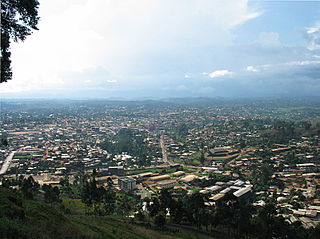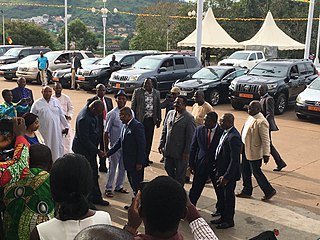
Ambazonia, alternatively the Federal Republic of Ambazonia or State of Ambazonia, is a political entity proclaimed by Anglophone separatists who are seeking independence from Cameroon. The separatists claim that Ambazonia should consist of the Northwest Region and Southwest Region of Cameroon. Since 2017, Ambazonian rebels have engaged in armed conflict with the Cameroonian military, in what is known as the Anglophone Crisis, setting up a government-in-exile and capturing some territory. No country has recognized Ambazonia's existence as of 2024.

Bamenda, also known as Abakwa and Mankon Town, is a city in northwestern Cameroon and capital of the Northwest Region. The city has a population of about 2 million people and is located 366 km (227 mi) north-west of the Cameroonian capital, Yaoundé. Bamenda is known for its cool climate and scenic hilly location.

The Southern Cameroons was the southern part of the British League of Nations mandate territory of the British Cameroons in West Africa. Since 1961, it has been part of the Republic of Cameroon, where it makes up the Northwest Region and Southwest Region. Since 1994, pressure groups in the territory claim there was no legal document in accordance to UNGA RES 1608(XV) paragraph 5, and are seeking to restore statehood and independence from the Republic. They renamed the British Southern Cameroons as Ambazonia.
Anglophone Cameroonians are the people of various cultural backgrounds, most of who hail from the English-speaking regions of Cameroon. These regions were formerly known as the British Southern Cameroons, being part of the League of Nations mandate and United Nations Trust Territories administered by the United Kingdom. An anglophone Cameroonian is widely regarded as anyone who has lived in the North West and South West regions of Cameroon, who has received an education from institutions modeled on the British system of education and law.

The Southern Cameroons National Council (SCNC) is a political organisation seeking the independence of the former anglophone Southern Cameroons from the predominantly francophone Republic of Cameroon. It is a non-violent organisation with the motto "The force of argument, not the argument of force." Because the SCNC advocates secession from Cameroon, it has been declared an illegal organisation by the government of Paul Biya. Security forces regularly interrupt SCNC meetings, arresting members and typically detaining them for several days before release.

The 2008 Cameroon protests were a series of violent demonstrations in Cameroon's biggest cities that took place from 25 to 29 February 2008. The protests followed on the heels of a strike by transport workers, who were opposing high fuel prices and poor working conditions. Further political turmoil had been caused by President Paul Biya's announcement that he wanted the constitution to be amended to remove term limits; without such an amendment, he would have to leave office at the end of his term in 2011. Large groups of youths, whom the opposition Social Democratic Front (SDF) political party and the government blame one another for organising, took to the streets of Douala, Yaoundé, Bamenda, and other major cities, looting and vandalising property. The government sent in troops to crack down on the unrest, and protesters and troops alike were killed. The official government tally is that 40 people were killed, but human rights groups claim that the total is closer to 100. Government figures place damage to property at tens of billions of francs CFA.
Paul Abine Ayah was a member of the National Assembly of Cameroon and a member of the ruling Cameroon People's Democratic Movement. Until recently, he joined the Opposition Party called the Peoples Action Party (PAP). In August 2007 he was elected as Chairman of the Foreign Affairs Committee of the National Assembly of Cameroon. He is a deputy for Manyu in the Southwest Region.

The cinema of Cameroon includes French and English-language filmmaking. The Anglophone film industry is sometimes known as Collywood.
Dr Fontem A. Neba is an Anglophone Cameroonian university lecturer, author and a civil rights activist who emerged on the Cameroon political stage as the founding Secretary General of Cameroon Anglophone Civil Society Consortium before it was banned by the government of Cameroon on January 17, 2017. He was arrested on the same day alongside Barrister Nkongho Felix Agbor and deported to Yaoundé overnight where they would both spend nine perilous months in the Kondengui Maximum security prison. Before becoming Secretary General of the banned Cameroon Anglophone Civil Society Consortium (CACSC), he was the Secretary General of teachers’ trade union of the University of Buea (SYNES) before his arrest on January 17, 2017, for staging a peaceful protest in the defence of Anglophone Cameroon common law system of education. He is the author of English Language Mastery and Academic Success which was launched on June 18, 2015.

The 2016–2017 Cameroonian protests were a series of protests that occurred following the appointment of Francophone judges in English-speaking areas of the Republic of Cameroon. In October 2016, protests began in two primarily English-speaking regions: the Northwest Region and the Southwest Region.

The Anglophone Crisis, also known as the Ambazonia War or the Cameroonian Civil War, is an ongoing armed conflict between Cameroon Armed Forces and Ambazonian separatist rebel groups, part of the long-standing Anglophone problem. Following the suppression of 2016–17 protests by Cameroonian authorities, separatists in the Anglophone regions launched a guerrilla campaign and later proclaimed independence. Within two months, the government of Cameroon declared war on the separatists and sent its army into the Anglophone regions.
Sisiku Julius Ayuk Tabe is an Ambazonian separatist leader from Ewelle village in Manyu division, and is the disputed first president of the unrecognized Federal Republic of Ambazonia. In January 2018 he was extradited from Nigeria to Cameroon, where he has been incarcerated ever since.
This is a timeline of the Anglophone Crisis during 2019.

Dr. Ebenezer Derek Mbongo Akwanga is an Ambazonian independence activist. He is the chairman of the African People's Liberation Movement, an Ambazonian separatist movement, and heads its armed wing, SOCADEF. A former student at the University of Buea, he and fellow activist Ayaba Cho Lucas founded a pro-independence student association. Their movement was soon outlawed, and in 1997, Akwanga was imprisoned for six years. Following his escape from prison, he joined forces with the Southern Cameroons National Council (SCNC). When the SCNC split into several factions, he became the leader of the Southern Cameroons Youth League (SCYL). The SCYL eventually transformed into the African People's Liberation Movement (APLM). In March 2019, he oversaw the APLM taking part in founding the Southern Cameroons Liberation Council, in an attempt to form a united front. Akwanga is also an advocate of the Biafran case, and has spoken in favor of an alliance between Ambazonian and Biafran independence movements. He has called for referendums on independence in both the former Southern Cameroons and Biafra.
The Cameroon Anglophone Civil Society Consortium (CACSC) is an Anglophone Cameroonian federalist movement.

The Major National Dialogue is the official name of a dialogue between the Government of Cameroon and various opposition parties, aimed at resolving the Anglophone Crisis. The event took place between September 30 and October 4, 2019.
This is a timeline of the Anglophone Crisis during 2020.
This is a timeline of the Anglophone Crisis during 2021.
Thomas Awah or Thomas Awah, Jr. is an activist and journalist from Cameroon born in 1969. Awah was arrested in 2017 and sentenced to 11 years imprisonment on charges of terrorism, spreading false news, hostility to the fatherland, secession, insurrection and revolution.
The Anglophone Crisis, an ongoing civil war between the Cameroonian state and Anglophone separatists who are trying to establish a new state called "Ambazonia", broke out due to grievances which built up within Cameroon at large and its English-speaking parts specifically over several decades.










